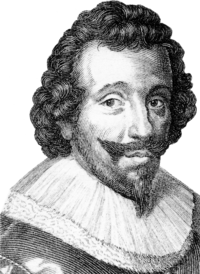Theophile de Viau
Théophile de Viau (* 1590 in Clairac ; † September 25, 1626 in Paris ) was a French writer . Very successful in its time, it was forgotten around 1700 and was only rediscovered by the Romantics in the 19th century .
Viau was the younger son of a Protestant aristocratic family and attended Calvinist schools in Montauban and Leiden (Holland).
As the young aristocrat he was, he became an officer and fought in 1615, in one of the armed conflicts between Protestants and Catholics that flared up again and again, initially on the Protestant side against the army of the young King Louis XIII. A little later he made his peace with him in order to gain access to court and good company in Paris and to find patrons more easily. From 1619, however, he had difficulties with the Jesuits , who denounced him as an unchristian libertine (free thinker), but also as an immoral man. He preferred to temporarily disappear from Paris.
In 1620 Viau fought in the royal army against the Protestants. In 1622 he also officially converted to Catholicism. De facto, however, he was and remained a libertine and Epicurean (follower of the Greek philosopher Epicurus, who affirmed lust and enjoyment). Perhaps his alleged homosexuality played a role here, which ultimately made him an outsider with both Catholics and Protestants and made him particularly aware of the precariousness and volatility of human existence.
As a lyric poet, who he was mainly, Viau orientated himself formally to Malherbe , but did not accept his sobriety and quasi handicraft haggling, but let the imagination and the spontaneity of feelings and thoughts run free. An anthology of his thematically diverse and often very personal poetry appeared for the first time in 1621 as Œuvres poétiques , clearly hit the mark of the times and experienced several expanded editions, with the last, published after Viaus death, still approx. Was reprinted 90 times (!).
Viau was also successful as a playwright with Les amours de Pyrame et de Thisbé (1621), a play about the love of the neighboring children Pyramus and Thisbe , which is hindered by both families and the king as a rival and ends in mistaken double suicide. The piece was reprinted 73 times between 1623 and 1698.
In 1623 Viau fled again from Paris when an anonymous erotic poem with a homosexual punchline was ascribed to him. In absentia he was sentenced to the stake and, after his arrest and another two-year humiliating trial, he was "pardoned" in 1625 and exiled from Paris. Obviously they wanted to make an example of him in order to discipline the other libertines, but they did not want to go to extremes given the great public pros and cons that the trial aroused. Viau was taken in by friends in the province, but died at the age of 36 from the health effects of imprisonment shortly after he was allowed to return to Paris.
Valued during his lifetime, Viaus' poetry later fell victim to the verdict of the Malherbe School, whose ideas prevailed. Only the Romantics gave him back his place as one of the best poets of the 17th century.
Settings
His poem À Chloris was set to music by Reynaldo Hahn in 1913 .
Web links
- Literature by and about Théophile de Viau in the catalog of the German National Library
- Article in Gert Pinkernell, "Names, titles and dates of French literature" (source)
Individual evidence
| personal data | |
|---|---|
| SURNAME | Viau, Théophile de |
| BRIEF DESCRIPTION | French author |
| DATE OF BIRTH | 1590 |
| PLACE OF BIRTH | Clairac |
| DATE OF DEATH | September 25, 1626 |
| Place of death | Paris |
